How To Install Corner Countertop
How to Install a Countertop
Footstep-by-pace instructions on how to install a pre-made plastic laminate countertop in your kitchen or bathroom.

We'll evidence yous 5 techniques for a great looking countertop installation. Buy the countertops premade, and so install them yourself by following our foolproof footstep-past-footstep instructions. We'll walk you through everything you lot need to know to improve the await and experience of your kitchen with new countertops.
You might also like: TBD
- Time
- Complexity
- Price
- A full day
- Intermediate
- Varies
Prefab laminate countertops
Plastic laminate countertops have been adorning kitchen cabinets for more than 50 years—and with good reason. Plastic laminate is a tough, durable material that comes in hundreds of colors and finishes. When applied to particleboard or plywood underlayment past a production shop, this proven product is platonic for kitchens, bathrooms and other settings. Past installing premade countertops yourself, yous'll save 50 percent of what a professional person installer would charge.
In this commodity, nosotros'll show you how to measure, buy and install your own countertops. Our instructions include how to make chip-free cuts, tight-to-the-wall scribes and nearly invisible joints for a professional looking job.
The easiest approach is to order custom-made laminate countertops (ours cost about $30 per running human foot) from a local abode center, full-service lumberyard or cabinet/countertop store. You can as well purchase premade accept-it-with-y'all stock tops (in limited colors) at many home centers, for about half the price of custom countertops. Shop for the latest in plastic laminates on manufacturer Web sites.
You tin can also view product samples at habitation centers and countertop suppliers.
3 special tools make all the deviation
- A belt sander with an fourscore-dust belt is a must for removing material along the behind of the backsplash (Photograph 7).
- You too need a scribing tool (Photo six) to make accurate marks along irregular walls.
- A 10-in. mill file and a smaller one-half-round file volition aid you get perfect fits for end caps (Photo 12).
- Besides these special tools, a 10-point or finer handsaw, drill, jigsaw, masking tape and tape measure are all you need.
Measure advisedly before you club your new prefab laminate countertops
Earlier ordering new countertops, you'll demand to make accurate measurements of your chiffonier layout. A word of warning here: If you have a U-shaped kitchen with two big miters and have never installed countertops earlier, you may want to rent a pro. Configurations similar this require you to scribe three walls at one time. Only if you have only one inside corner as we did, the project is well within the skill level of the average practice-it-yourselfer.
Brand a sketch and then, starting from the back walls, measure the exact lengths from the walls to the border of each run of cabinets. Add three/4 in. to the length of each section to allow for overhangs. Allow an actress inch to protrude into a freestanding range space. You'll trim it off later for an verbal fit (Photo 11). Order a laminate terminate cap (or make your own, Photo 12). If you demand to butt the countertop into a side panel like a pantry or fridge cabinet, add an extra one in. for notching (Photos 14 – 16). This will give a more finished await than a straight cut. Likewise measure the depth of your base cabinets. Standard laminate tops are 25 in. deep. Bank check to make sure y'all'll accept at least one/2-in. overhang beyond all the drawer fronts.
Most manufacturers will supply preshaped and preglued iron-on finish caps to cover finished ends, but I prefer to society a little extra plastic laminate that I can score and cut and glue into place with contact cement for a longer-lasting grip. Either arrangement works fine, but if this is your first get at this type of projection, you'll find the fe on end caps easier to install. Simply keep in mind you'll need to practice a flake of filing in either case to shape the end caps. Another important consideration is corner and edge style. To fit our design requirements, we chose foursquare corners for all our edges. If you want whatever rounded corners on exposed edges, discuss this with your supplier ahead of time and ask to see sample profiles.
You'll also demand build-upwardly strips (usually 3/4 in.) (Photo 2) to support the pinnacle across the cabinets. At start glance, countertops announced to exist one-1/two in. thick, just the substrate that the laminate is glued to is actually just 3/iv in. thick, every bit the underside reveals. Applying additional build-up strips to the meridian of your cabinets will fill the void at support points and elevate the countertops above elevation drawers. When ordering, ask for build-upward strips, only go along in mind you can easily make your own from scrap 3/four-in. plywood or one×two pino.
Once you consummate your measurements, take your drawing to your countertop supplier and talk over your programme to make certain you've covered all the bases. If you don't accept a dwelling center near you or your lumberyard doesn't provide this service, check the net for "Countertops." When you place your order, enquire about delivery to your home. In near cases, the odd shapes are unwieldy and won't rest deeply on top of the family car.
Measure at To the lowest degree Twice to Locate the Sink
You tin get into trouble here if you don't think through iii important steps:
- Center the sink over the sink base cabinet.
- Set the sink back far enough to clear the chiffonier front.
- Cut the pigsty smaller than your sink'due south rim.
For about stainless steel sinks, it's condom to flip the sink over and trace around it and then brand some other line 1/ii in. within the trace line (Photo viii). The exception hither is an asymmetrical shape where the left side is different from the right side. Check this carefully, especially if you're reinstalling your old sink and no longer have the original template (most new sinks come up with a full-size template). If you're installing a cast iron enameled sink, you should make an even smaller cutout, leaving more than countertop to support the weight of the sink. Usually most cast iron sinks will allow you to cut inside the traced perimeter at least 1 in. Once you've traced the outline, describe some other line inside the outset, drill your holes (Photograph ix), then flip the countertop over, transfer the lines (Photo ten) and cut out the top.
Scribing your backsplash to the wall is the well-nigh crucial step
You tin starting time with whatever section of countertop, but it'south best to begin with the longest corner section considering the other sections often join or chronicle to this slice. Our long department had a number of fitting challenges—especially the corner. To get an accurate scribe to the wall here, you need to temporarily bring together the corner (Photo 5).
To do this, install the miter bolts equally shown in Photo 5 and and so slide the top into the corner for a exam fit. Before yous scribe, align the front edges of the countertop parallel to the cabinet fronts. Close gaps where the backsplash meets the wall if possible. Scribe the summit as shown in Photo six. Keep in listen y'all can remove up to 1/2 in. from the backside of the backsplash to fit your wall. This is more than enough in most cases, so don't panic if your adjoining wall looks out of whack.
Adjacent, sand downward the back border (Photo 7) of the backsplash to your scribe line with a belt sander. Tip the belt sander slightly to undercut the backsplash for a tighter fit. Set the countertop back against the walls and check it for fit. Information technology should fit on the first try, but you lot may demand to do some additional sanding for a tight fit.
Next, remove the miter bolts and separate the sections so you tin can cut the sink opening (Photos 8 – 10).
Tip: Exist sure you have a build-up strip under the backsplash backside the sink and at each side of the sink base cabinet. The full weight of the sink needs continuous support.
Cut the Opening from the Bottom Side
Use a jigsaw with a medium-cut blade. The blade cuts on the up stroke, and then do all your cuts from the lesser of the countertop to minimize chipping. Be sure the cutout is supported when y'all achieve the stop of your cut so you don't pause an edge. After the hole is cutting, set the sink into the opening to cheque the fit. Practice a chip of trimming if it binds every bit you driblet information technology in.
Use a handsaw to cut the countertop to length
Before nosotros could get together the miter joint, we had to cutting the short section of the countertop exactly flush with the chiffonier stop (Photograph 11) to make room for the range. If you're skilled with a circular saw, yous can make this cut from the underside with a 40-tooth carbide blade, but it's risky. Ane false move and yous've got another workbench top! Why have chances? A sharp handsaw volition give yous a nice, ho-hum, controlled cutting and time to react if the cut is straying from your mark. Use a traditional saw that cuts as you button the blade away from you. Printing masking tape over the area you plan to trim.
The masking tape serves a dual purpose here: It lets you lot easily see your pencil mark and information technology reduces chipping of the laminate as you cutting. After the cutting, use a belt sander to sand correct to the line. Make certain you lot've fabricated a square edge. Next, mucilage a build-up strip to the bottom flush with the newly cut border and clamp it in place.
Once the glue is dry, you can use matching plastic laminate over this built-up edge. If you don't have a precut cease cap, cut one from your extra slice of laminate. Make a couple of practise cuts with a laminate cutter (Photograph 12) before you lot try the existent matter. Set up your laminate on scrap woods (not on your new countertop!) and draw the shape of the terminate cap plus i/4 in. extra on both the top and front.
Score the summit several times to cut through the laminate, using a straightedge equally a guide. Be careful nearly the corner where the backsplash department leaves a right angle ascent. It'south easy to break this little chunk off.
Apply contact cement to each mating surface and permit it dry to the bear upon (most xx minutes). Then position the finish cap even with the bottom edge of the build-up filler strip and press it firmly into place.
Using a dry rag, firmly wipe the surface to further printing it for a proficient bail. At present file the end cap flush to the countertop (Photo 12). Take your time with ho-hum, controlled strokes. When the border is almost flush, slightly bevel the finish cap to remove sharp corners that could snag a dishcloth afterward. Finally, push the sections back together, apply caulk and join the miter (Photo 13). Then install the miter bolts using the method shown in Photos four and 5.
Cutting a return
You may not have to make a "return" cut in your countertop like the i shown in Photos fourteen—16. If you lot practise, follow the photograph sequence. Then cut and gum a small slice of laminate to the exposed edge.
Although nosotros made the countertop affluent with the cabinet side (to accommodate the range, Photograph 14), y'all may have to adjust your scribe to permit for an overhang (Photo 15).
Use steel angles to anchor the top
Professional installers vary profoundly in their methods of fastening countertops to base of operations cabinets. Some simply glue them down with construction adhesive, while others screw through the cabinet corner braces or sides into the top. Using 1-ane/2 in. steel angles like those shown in Photo 17 is foolproof and uncomplicated.
You can buy them at whatsoever hardware store, but don't utilize the screws provided. Instead, buy five/8-in. long No. 8 screws. I like to place them a hair lower than the top of the cabinet (or build-upward) and so depict the top down tight with a screw into the underside of the countertop. Employ as many angles as it takes to go a solid installation. Figure on using four every 3 ft.
Good Care Ways No Harsh Cleaners
To become the most life from your new countertops, follow these simple rules:
- Never use the countertop every bit a cut lath.
- Never use bleach or abrasive cleaners. Instead, apply products like Fantastic, Formula 409 or Pine-Sol applied with a soft cotton cloth.
- Avoid setting annihilation hotter than 140 degrees F. on your countertops. Yous could burn the laminate or break the glue bond below.
Required Tools for this premade countertops project
Have the necessary tools for this DIY projection lined up before yous commencement—you'll relieve time and frustration.
Yous'll as well need a specialty tool: a laminate cutter
Required Materials for this premade countertops project
Avoid last-infinitesimal shopping trips by having all your materials prepare ahead of time. Hither'due south a list.
Source: https://www.familyhandyman.com/project/how-to-install-a-countertop/
Posted by: sharpebeight1953.blogspot.com

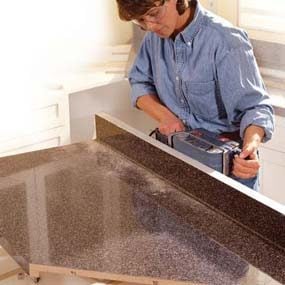
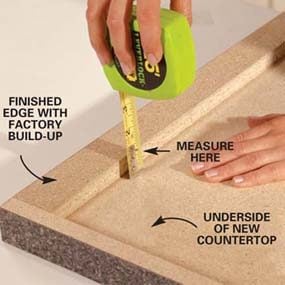
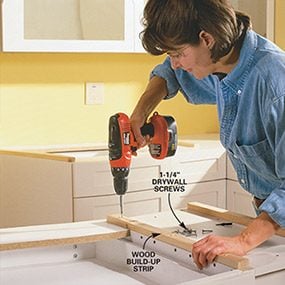
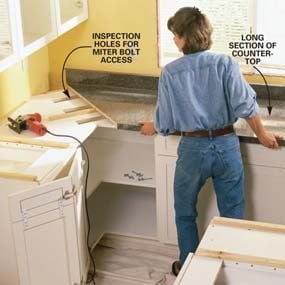


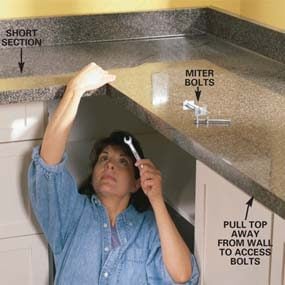

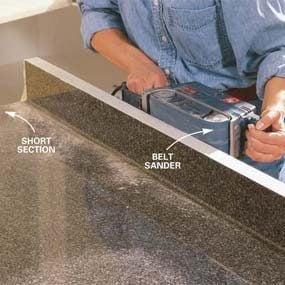
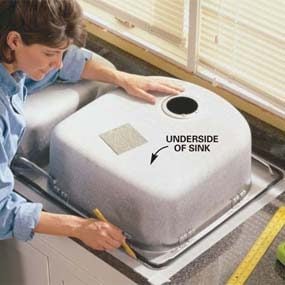
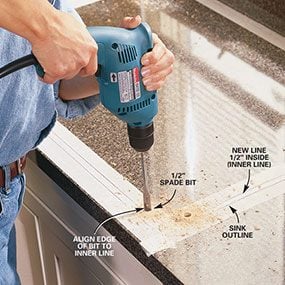
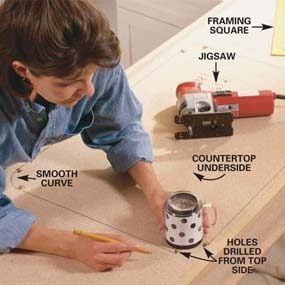
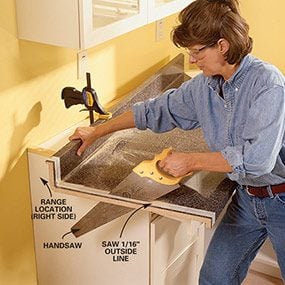
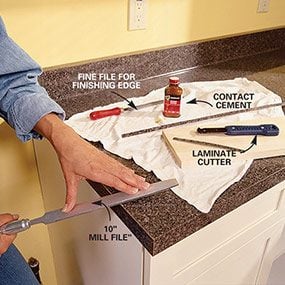
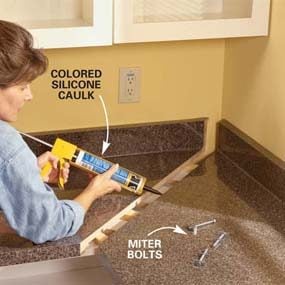
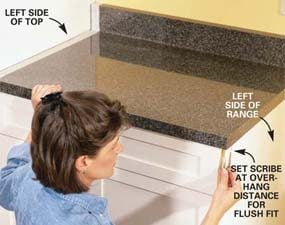
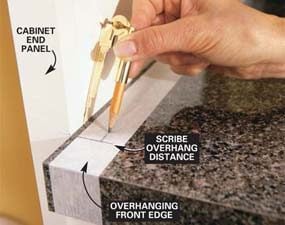
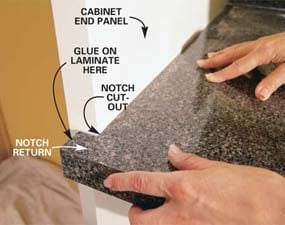
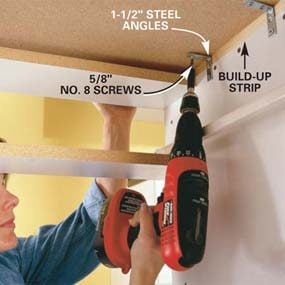
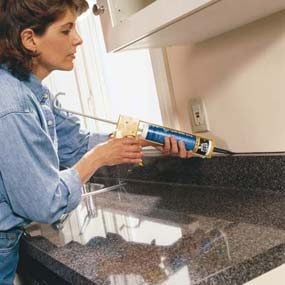

0 Response to "How To Install Corner Countertop"
Post a Comment